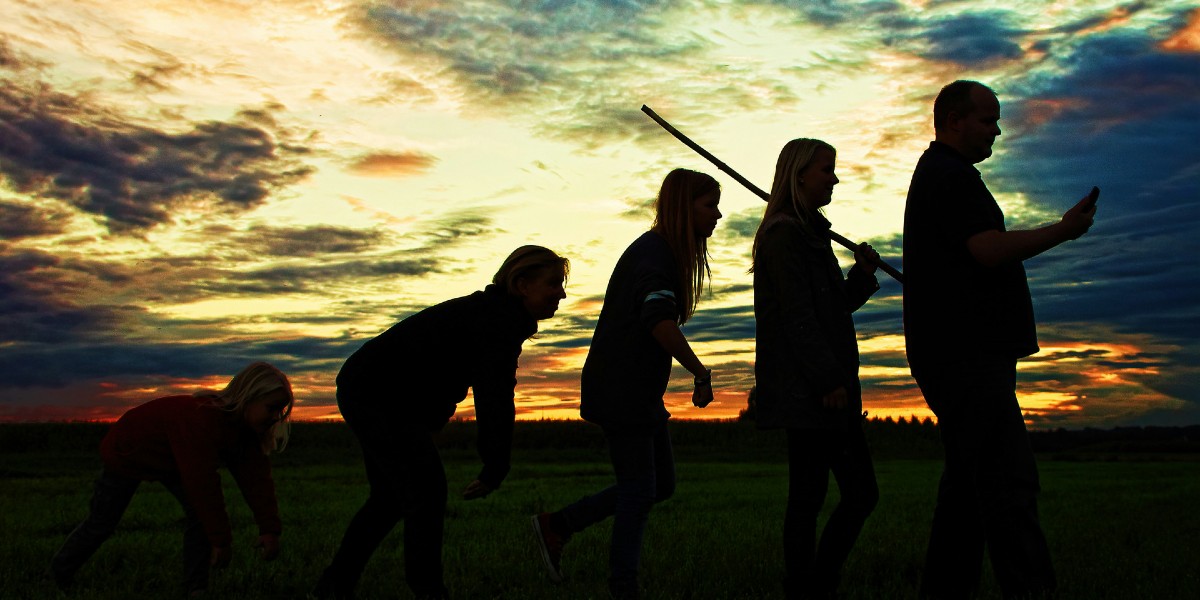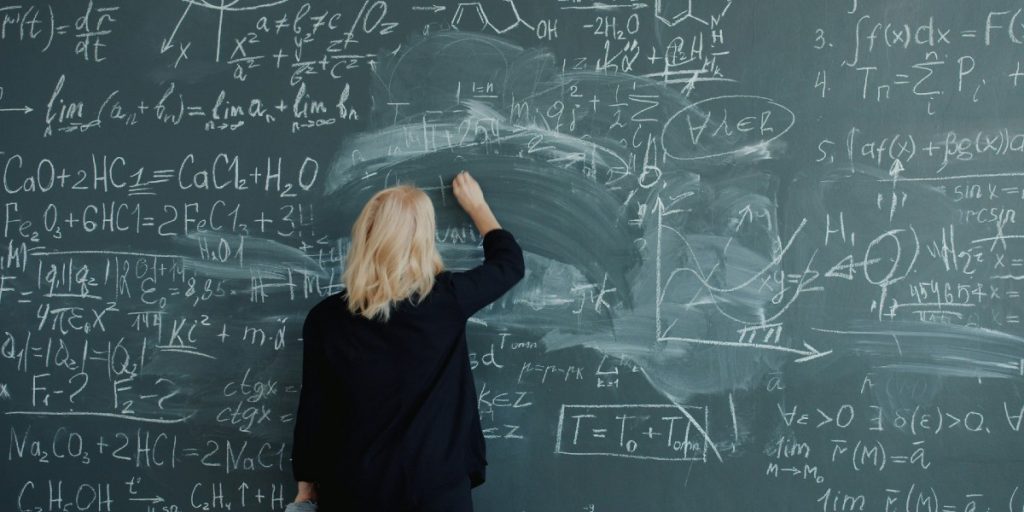Madeleine Beekman is professor emerita of evolutionary biology and behavioral ecology at the University of Sydney, Australia. She has spent most of her career studying cooperation, intelligence, and communication.
What’s the big idea?
How did humans become so different from other species and attain global dominance? Well, it seems we may have just stumbled into evolutionary victory because of a series of happy accidents. It is both fascinating and humbling to understand the biology of how and why Homo sapiens became so powerful.
Below, Madeleine shares five key insights from her new book, The Origin of Language: How We Learned to Speak and Why. Listen to the audio version—read by Madeleine herself—below, or in the Next Big Idea App.

1. Evolution is lazy.
Evolution is not the meticulous craftsperson you may think it is. Instead, evolution is a pragmatic tinkerer, frugal, and opportunistic. It tries to solve problems using whatever is lying around, and it rarely overdelivers. If a simple solution will do the trick, natural selection usually won’t bother with bells and whistles.
What’s remarkable is how easily evolution can be carved up into a short series of discrete accidents—a humbling handful of mistakes. Evolution by natural selection has always been the science of dumb luck. There’s nothing special about the winner of a single-elimination coin-flipping tournament, even if it runs to a million rounds. The structure of the contest is what guarantees that someone or other will prevail. But what’s stunning about our descent from other apes over the last six million years is that it boils down to just a handful of key moments:
- Losing a chromosome.
- Neoteny, meaning the slowing down of development in an embryo.
- Chromosome inversion.
- Gene repair.
- Gene duplication.
- The descent of the larynx.
For me, these “mistakes” collectively sum up how we got from chimpanzees to chatty apes. Every time a mistake was made, it could have been the end of our lineage. But through dumb luck, evolution through natural selection made the best out of a bad job. And here we are.
2. There is more than just DNA.
It is generally easy to visually distinguish a chimpanzee from a human. The same cannot be said when examining their DNA. If you were to compare our DNA with that of a chimpanzee, you would only find a difference of about 1 percent. That means that we share close to 99 percent of our DNA.
Such genetic similarity was not what we expected when scientists started the Human Genome Project. In fact, the Human Genome Project was supposed to reveal what makes us human. Clearly, whatever it is that makes us human is not to be found simply in our DNA sequence.
One significant difference between humans and chimpanzees is that humans have lost a chromosome. Well, we didn’t really lose it, but two chromosomes stuck together and stayed together. In chimpanzees, the two remained separate, resulting in 24 pairs of chromosomes, compared to our 23.
“Clearly, whatever it is that makes us human is not to be found simply in our DNA sequence.”
The way DNA is organized helps explain why we are similar genetically, but different in many other ways. When the order of the DNA sequence changes, different genes may be switched on or off at different times, and the timing of this process is crucial. The loss of a chromosome was the first mistake that ultimately made us human. No big changes in DNA sequencesome tinkering did the trick.
3. We have been social for a very long time.
Our social life started more than four million years ago, when our ancestor Lucy made her appearance. Lucy’s scientific name is Australopithecus afarensis. She received her nickname thanks to the song “Lucy in the Sky with Diamonds,” which was popular at the time of her discovery. I imagine a bunch of paleoanthropologists sitting in a hot and dusty tent, brushing dirt off ancient bones while listening to the Beatles.
Lucy and her species were probably the first of our ancestors to permanently walk on two legs. That had serious consequences. Ever tried to outrun a dog? If you have, you know that it can’t be done when your dog is in the mood for running. No two-legged creature can outrun a being with four legs. Without the ability to quickly retreat high into trees, Lucy and her ilk were at a serious disadvantage in an environment rife with four-legged predators. As a defence strategy, they stayed together. Safety in numbers.
Having others around was necessary for more than one reason. Babies needed help being born because of the changes to the pelvis caused by walking upright. The orientation of the birth canal twisted so that babies were now born facing down instead of facing up toward mom. While mom in the past could help the baby out, now she couldn’t without risking breaking its neck.
Those little ones caused more problems. Our ancestors may have freed their hands by becoming two-legged, but these hands were quickly filled with babies. When you walk upright, you can no longer throw your baby on your back and expect it to hold on. Babies literally became a handful.
4. Babies made us speak.
When biologists list the features that distinguish Homo sapiens from other species, we usually include our language and the immaturity of our infants. These might seem unrelated, but I argue that talking and caring for “underbaked” newborns coevolved in an episode of runaway selection initiated by the genetic anomalies that we now know spurred our species’ neurological growth.
Rudimentary spoken language first became a realistic possibility when our brains grew large enough and our voices became versatile enough for us to assign complex meanings to complex sounds. It turns out that the versatility required to articulate the sounds of human speech was an indirect side-effect of the skull change necessitated by our brain change. You could say that big brains themselves were the childcare solution our species sorely needed. But of course, in an ironic twist only Mother Nature could have conceived, our big brains were also the main cause of the problem.
Our babies are born earlier because their heads are too large—and our birth canals are too small—for them to be born any later. But why did our brains get so big? And why did our hips get so narrow?
The pelvis problem was a side effect of walking upright. As our ancestors became better at walking on two legs, the pelvis adapted to improve balance and allow for a more secure attachment of the thigh muscles, which now carried our weight. Those changes inadvertently pinched and narrowed the birth canal. Which was tolerable, until we let our heads get so big.
“The harder the task, the more language we need for planning and project management.”
The brain problem originated from a torn chromosome that inverts to create a “gene nursery.” Then, a long-broken gene in the nursery got repaired and started copying itself. Once active, those copies served to slow down the process whereby glial cells in the brain differentiate into neurons. This led to more computing power than ever before.
Bigger brains mean earlier births. Earlier births require more support. Language is how we ask for help and coordinate it. The harder the task, the more language we need for planning and project management. But developing a proto-language requires increasingly more cognitive resources, which in turn necessitates larger brains. So, we were trapped in a catch-22. Our mushrooming ability to voice the needs of mother and child meant we could accommodate more offspring with each generation. This, of course, only exacerbated the demands of childcare, but also safeguarded the survival of our species.
5. It pays to be humble.
If you were taking bets roughly 300,000 years ago—when modern humans first came onto the evolutionary scene—smart money might have been placed on one of the four or more sister species of Homo roaming the Earth alongside us. Homo sapiens have a design flaw that could easily have spelled extinction: our ability to speak originated from the descent and stretching of our larynx and tongue, which was caused by changes in skull morphology resulting from our expanding brains. But those changes have a dangerous side-effect—the risk of choking when food or drink goes down the wrong spout. Yet we survived, surpassed our peers, and eventually subjugated the planet, all thanks to an evolutionary moonshot.
The picture, in the end, is of an odd species that stumbled into global dominance through a relatively quick succession of simple mistakes, not unlike Peter Sellers’ character in Being There. If that sounds contrarian or misanthropic, I’d say humanity hasn’t been burdened by an overabundance of humility lately. As we continue to ravage the natural world and violently enforce socioeconomic hierarchies based on meaningless biological differences, it may be time to take ourselves down a peg—or twenty.
A certain genre of popular science titles tries to tackle the question: What makes us so special, as a species? My answer is: We aren’t, really. Our greatest distinction may well turn out to be that we’re the first and only creature to eradicate the rest of life on Earth. If my version of our origin story is humbling, perhaps that’s what this world-historic moment calls for.
Enjoy our full library of Book Bites—read by the authors!—in the Next Big Idea App:































